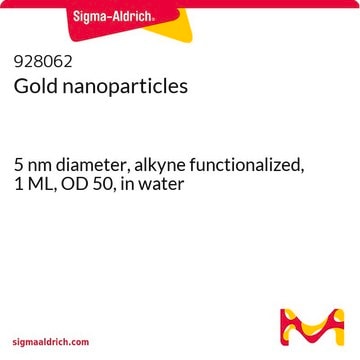765260
Gold nanoparticles
5 nm diameter, amine functionalized, PEG 3000 coated, OD 50, dispersion in H2O
Synonym(s):
Gold nanoparticles NH2 functionalized, Au NP NH2, Gold Colloid
About This Item
Recommended Products
material
PEG 3000
form
dispersion in H2O
nanoparticles
packaging
glass bottle of 1 mL
OD
50
diameter
5 nm
pH
6.0-8.0 (25 °C)
solubility
water: miscible
density
1.00 g/cm3
λmax
515 nm
functional group
amine
storage temp.
2-8°C
Looking for similar products? Visit Product Comparison Guide
Application
AuNPs can be potentially immobilized on antibodies to improve the sensitivity of optical fiber sensors for the screening of COVID-19. They can also be deposited on the titanium electrode for the formation of a miniaturized device for the electrochemical detection of DNA hybridization, which can be used in the diagnosis of COVID-19.
Features and Benefits
- Negatively charged siRNA-PEG complex which is attached to positively charged GNPs is easily cleavable in reductive cytosolic environment thus enabling the release of siRNA into cytosol.
- Decreases the cytotoxicity and increases efficiency of GNPs. PEG increases the stability of the nanoparticles and prevents agglomeration.
Storage Class Code
12 - Non Combustible Liquids
WGK
WGK 1
Flash Point(F)
Not applicable
Flash Point(C)
Not applicable
Certificates of Analysis (COA)
Search for Certificates of Analysis (COA) by entering the products Lot/Batch Number. Lot and Batch Numbers can be found on a product’s label following the words ‘Lot’ or ‘Batch’.
Already Own This Product?
Find documentation for the products that you have recently purchased in the Document Library.
Articles
The recent emergence of a number of highly functional nanomaterials has enabled new approaches to the understanding, diagnosis, and treatment of cancer.
Biomaterials science integrates smart materials into biological research, requiring a deep understanding of biological systems.
Our team of scientists has experience in all areas of research including Life Science, Material Science, Chemical Synthesis, Chromatography, Analytical and many others.
Contact Technical Service





